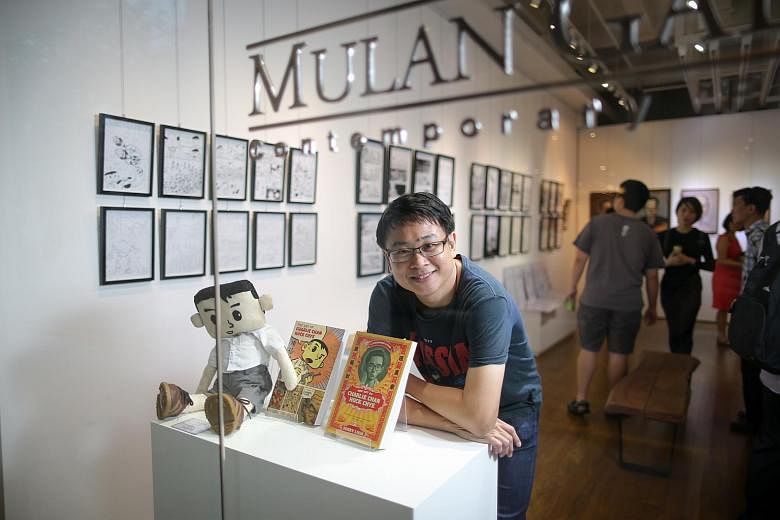It is a pity that graphic novelist Sonny Liew's recent big win at the prestigious Eisner Awards, the comics equivalent of the Oscars, has generated more controversy than celebration.
That was linked to a 2015 decision by the National Arts Council (NAC) to withdraw an $8,000 publishing grant over what it had deemed to be "sensitive content" in The Art Of Charlie Chan Hock Chye, the work that won Liew three Eisners last month. The episode has stirred lively debate on social media. In my view, it also reflects the inferior status of artists in Singapore society.
Local artists are often seen as existing on the fringes of society. They tend to receive mainstream attention only when they get into disagreements with the authorities. Two examples that come to mind include "Sticker Lady" Samantha Lo, who was arrested in 2012 for illegal street art of Singlish slogans, and Lasalle art student Priyageetha Dia, who broke town council by-laws when she used gold foil to create a "golden staircase" in an HDB block. They made headlines not for artistic merit or for daring to raise questions about Singaporean identity but because their actions were deemed inappropriate and even frivolous.
My own experience as an amateur musician has provided ample evidence that many here regard the arts as a waste of time. As a double bassist with the Singapore National Youth Orchestra from 2005 to 2012, I was often told by teachers and relatives that it was pointless to spend time learning a musical instrument. They only changed their tune when they realised that doing so was one way to earn co-curricular activities (CCA) points. Such a calculated approach reflects a lack of understanding of the arts' invaluable role in shaping our national identity, a role that in my view is growing in importance as Singapore seeks to develop a future economy and a Smart Nation.
We live in a time of rapid change and disruption, an era in which - to quote Massachusetts Institute of Technology Media Lab director Joi Ito - "technology always outstrips our ability to understand it". Technologies are useless "until they are animated by human ideas", Ito writes in his book Whiplash. The arts generate these human ideas; they are therefore the creative sparks that light the way to the future economy.
I can attest to how works by local artists have fuelled my personal growth as a young Singaporean. I remember watching Tan Tarn How's Fear Of Writing in 2011. I was then about to start my university studies. The play led me to question how my academic training conditions me to think in a limited way, demarcated by the divisions between academic disciplines. Similarly, when I watched W!ld Rice's Another Country: Singapore And Malaysia Re-united, I was forced to re-examine the adversarial narrative of Singapore-Malaysia ties. I was serving my national service then and the play made me wonder how shared memories between Singaporeans and Malaysians could be a source of strength and cooperation rather than friction.
Broadening the mind of a young, impressionable Singaporean may not seem like much in the grand scheme of national policy, but the arts create a crucial space to reimagine new futures for ourselves. Beyond their value in fostering more complex notions of national identity, another reason that investing in the arts is good policy is that Singapore has world-class talents right here - ripe for the picking. Take film-making as an example: Sound editor Ai-Ling Lee was nominated last year for an Oscar for her work on La La Land and director Anthony Chen bagged multiple Asian Film awards and the prestigious Camera d'Or at the 2013 Cannes Film Festival for his film Ilo Ilo.
In music, which is the art form I am most familiar with, I know of fellow musicians who regularly represent Singapore in the Asian Youth Orchestra and many others who go on to pursue degrees in world-class institutions.
Despite these achievements, it seems that it will be awhile before artists are given the same level of recognition as world-beaters in other fields, such as sports. Yet, if we continue to relegate the arts to an inferior position relative to other more measurable achievements, we do a huge disservice to our nation by quashing the creative imaginaries that are crucial in shaping our emergent national identity.
Our path forward as a nation is less straightforward than it was in the past and we need to foster artistic endeavours that help society understand and interpret identity, culture and history.
Failing to recognise this early enough could strip soul and imagination from this city - and it will be too late when we eventually look back and wonder why, despite technological advances, local talents continue to flock to artistic capitals such as London and New York City, where the confluence of finance, innovation, technology and the arts is not a happenstance.
- The writer, a former principal bassist of the Singapore National Youth Orchestra, is a recent Master in Public Policy graduate from Harvard Kennedy School.

